CHA Spring 2019 Career Fair – Photo Gallery
Thanks to all our presenters, attendees and volunteers who made our recent Career Fair at Chapel Hill Academy such a great success. Here’e a gallery of photos from our event. Enjoy!
Thanks to all our presenters, attendees and volunteers who made our recent Career Fair at Chapel Hill Academy such a great success. Here’e a gallery of photos from our event. Enjoy!
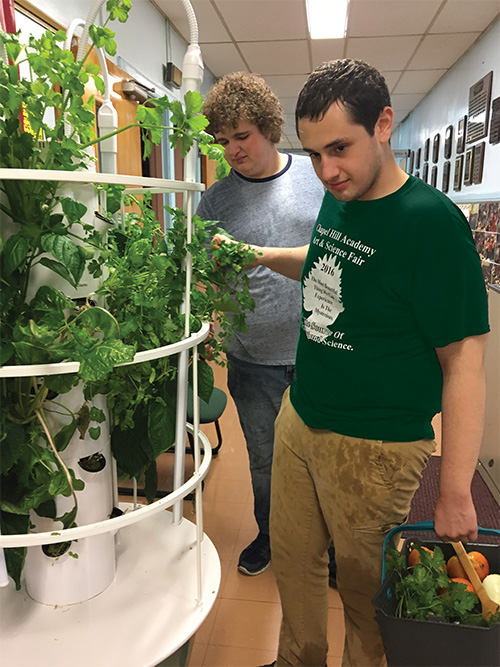 The students in biology classes at Chapel Hill Academy are not only learning biology, but also important life lessons as they grow and prepare their own food. Tammy Perkins, the biology teacher, received her Master Gardening certification and is bringing her passion and knowledge to her students through the new hydroponic gardening towers.
The students in biology classes at Chapel Hill Academy are not only learning biology, but also important life lessons as they grow and prepare their own food. Tammy Perkins, the biology teacher, received her Master Gardening certification and is bringing her passion and knowledge to her students through the new hydroponic gardening towers.
Last April, the Health Department of Lincoln Park received a grant as part of NJ Healthy Communities Network to purchase hydroponic towers. Chapel Hill Academy received two of these towers, which students helped to construct and continue to maintain. Hydroponic gardening is a form of indoor gardening where plants are grown year round without soil. The towers are an addition to the existing outdoor raised garden beds, which have supplied pumpkins, zucchini, broccoli, cucumbers, eggplants, and herbs.
“Gardening used to require an outdoor space and was limited by season and weather, but this is no longer the case. Hydroponic systems allow our students to enjoy the benefits of gardening all year and in any kind of weather,” said Ms. Perkins.
Hands-on lessons teach students the requirements of water and light for the plants, the importance of pH and macronutrients, the different parts of the plants that provide nutrition for the human body, the different types of flowers and the challenge of indoor pollination and insect control, to name a few. Gardening is experimental, so after trying to grow a number of vegetables, the students have already learned that the hydroponic towers are better for growing leafy vegetables such as kale, herbs and lettuces since they do not need to cross pollinate.
In addition to the excitement of monitoring the vegetables as they emerge and grow, the students work collectively to harvest the vegetables, follow recipes to cook them, and then finally eat them. Sometimes the vegetables are a variety the students are trying for the first time.
“It is exciting to have the opportunity to connect students with healthy food that they have grown themselves. They are socializing and sharing in this wonderful experience while learning important social skills, collaboration, healthy eating, and of course, biology. The benefits of gardening and connecting with nature are proven to reduce anxiety and negative feelings and I see it with my students,” said Ms. Perkins.
This winter, while the school’s butterfly waystation is void of swirling butterflies and the outdoor raised garden beds are covered under snow, students in Ms. Perkins’ biology classes will continue to grow nutritious food and enjoy warm meals together.
Students come to Chapel Hill Academy with a range of challenges, including learning disabilities such as dyslexia and dysgraphia. Some students struggle to make the connection between sounds and symbols, while others have trouble with comprehension. Any one of these difficulties can affect learning across all content areas. That is where Maggie Kondovski, LDT-C, Supervisor of Instruction, steps in.
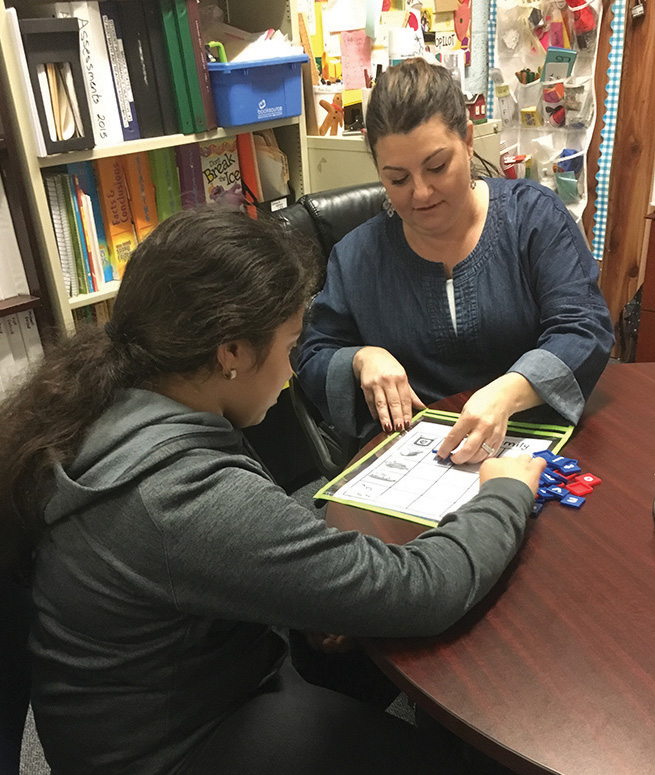 The Remedial Reading Program at Chapel Hill Academy supports students in all grades, but specifically targets those students in grades 2-6. Ms. Kondovski conducts informal assessments several times a year, observes in the classroom, and consults with parents, teachers and counselors to identify students who might need extra support. “Together we choose a path,” she said.
The Remedial Reading Program at Chapel Hill Academy supports students in all grades, but specifically targets those students in grades 2-6. Ms. Kondovski conducts informal assessments several times a year, observes in the classroom, and consults with parents, teachers and counselors to identify students who might need extra support. “Together we choose a path,” she said.
Different approaches work for different students. When teaching students to read phonetically, educators create materials using Explode the Code®, a program rooted in Orton-Gillingham®. For students whose challenges are in the areas of memorization and visual discrimination, they might use the Edmark Reading Program®. Both programs are evidence-based, structured, and sequenced.
But it is not the program alone that makes the difference. “The challenge is studying the student to make a determination as to which direction best suits their specific learning needs and style,” Ms. Kondovski said.
Ms. Kondovski recalled a 3rd grader who struggled with both behavior and reading. For a full month, they met every day, just building rapport. “We didn’t discuss reading at all. I got to know him: his favorite ice cream flavor, who was in his family, and what shows he watched. That made all the difference. When I began addressing the reading, he trusted me,” she said.
Over time, she increased the reading instruction, using a phonetic approach and activities that would engage him. “We worked together every day for two years; he became a more fluent reader and developed confidence,” she said.
Under Ms. Kondovski’s instructional leadership, teachers at Chapel Hill Academy learn to alter workbooks into games to engage the students, while providing materials that are multi-sensory.
“Our students need instruction that is systematic, repetitive, and presented in varied forms. Our teachers take the time to discover what motivates each student and to develop games based on their interests. The methods and materials have changed throughout the years, but the approaches remain the same: develop a rapport and provide materials and instruction that are unique to each student,” she concluded.
This fall, high school students at Chapel Hill Academy were introduced to a new incentive system, allowing them to earn privileges and access to special events.
 The new system works with the current BASE system. Based on the number of points they earn each week, students receive credits in their “account.”
The new system works with the current BASE system. Based on the number of points they earn each week, students receive credits in their “account.”
Through the new “levels” system, students earn credits they can use to purchase access to food, trips to local restaurants, recreational trips like bowling and billiards, and even the option to eat lunch in the homeroom, where there is a quiet, comfortable social setting. The total number of credits earned for the year is also tracked. At certain intervals, new status levels are achieved. These levels may include privileges that do not need to be purchased. “By far the most popular privilege comes with earning Gold status, unlocking music and gaming sites for their Chromebooks,” added Somers. The new system affords students increased chances for social interactions, including an upcoming trip to historic Asbury Park.
“The new system of levels has our students more engaged and involved in earning their points on a daily basis,” added Mr. Somers, who has been with the school for 15 years. “They often ask about the number of points they need to earn their next credit or how close they are to earning an upgraded status. They are also very involved in selecting new privileges they would like to earn,” he concluded.
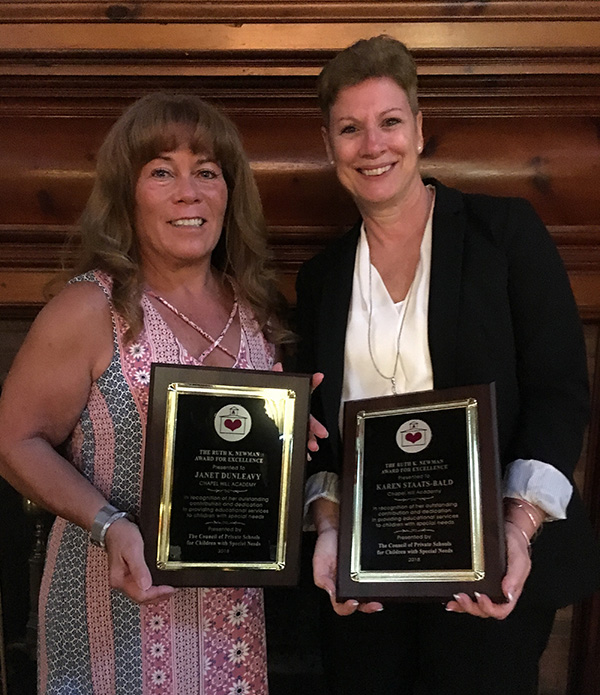 Congratulations to Janet Dunleavy and Karen Staats-Bald who were awarded the 2018 Ruth K. Newman Award for Excellence from the Council of Private Schools for Children with Special Needs.
Congratulations to Janet Dunleavy and Karen Staats-Bald who were awarded the 2018 Ruth K. Newman Award for Excellence from the Council of Private Schools for Children with Special Needs.
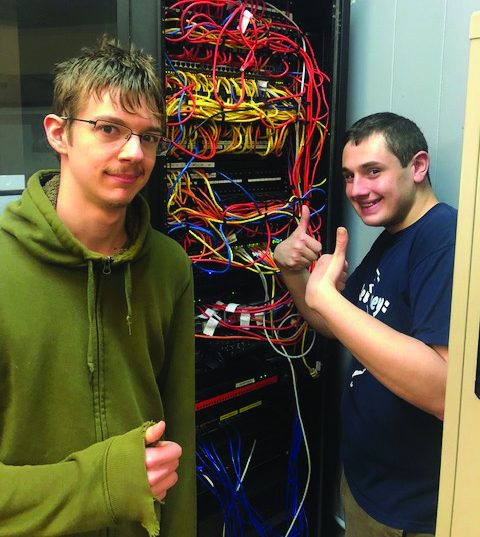 As the global economy shifts to focus on technology, students need technical skills that bring opportunities for high-value jobs. Chapel Hill Academy is preparing students through its partnership with Cisco Networking Academy.
As the global economy shifts to focus on technology, students need technical skills that bring opportunities for high-value jobs. Chapel Hill Academy is preparing students through its partnership with Cisco Networking Academy.
Michael Padula, an educator at CHA, introduced Cisco Networking Academy four years ago. The program fosters the technical and entrepreneurial skills needed for careers in networking and communications.
“The classes and certifications make sure students have the capability to support Cisco-made products and have the skills to troubleshoot different kinds of technology problems,” said Mr. Padula. “Once a student earns certification, they can put it on their resumes, and that helps them in getting and working in IT-related jobs,” he concluded.
Students who take and pass IT Essentials are ready for an entry-level IT position. They have working knowledge of how computers and mobile devices operate; can identify common security threats and vulnerabilities like malware, phishing, spoofing, and social engineering; and can apply skills and procedures to install, configure, and, troubleshoot computers, mobile devices, and software. More advanced courses prepare students with skills they need to manage networks and data.
“The program helps them develop critical thinking and problem-solving,” added Mr. Padula.
The internationally-recognized training program is now taught in more than 10,400 schools in 180 countries. Chapel Hill Academy is one of only three state-approved private special education schools in New Jersey to offer this program. “We want our students to have options for high-value jobs, as well as college, so our transition services reflect coursework to get them ready for whatever they choose,” said Diane Somers, Director.
Other graduates have gone on to jobs, volunteer work and have continued their education at Rowan University, Iona College, Highpoint University, Bergen Community College, Lincoln Tech, County College of Morris, and Bergen County Vocational School.
If you are a graduate of CHA and want to let us know what is happening in your life, please write to us at info@chapelhillacademy.net.
Every year, schools across New Jersey use the month of October to focus on kindness, respect, anti-bullying, and diversity. Chapel Hill Academy is excited to be celebrating these themes in a variety of different ways. Social skills, art, P.E., health and other classes will provide age-appropriate activities and instruction based on character building and bullying prevention. We will have themed t-shirt days and several fantastic assemblies and talks aimed at various age groups. In addition, we encourage you to discuss the meaning of respect with your child, and ways to show kindness, tolerance, and compassion for others.
If you have any questions or concerns regarding our planned activities or otherwise, please feel free to contact your child’s counselor. Thank you in advance for your participation and continued support!
Sincerely,
The counseling staff at Chapel Hill Academy
Every Monday of the month we will wear blue in order to show solidarity against bullying and a promise to show kindness and respect for others.
Art and Social Skills classes will feature this theme throughout the week
Voices in Harmony was a musical celebration featuring students from all over the New Jersey area. Held at the Bergen Performing Art Center in March, the organization’s Performing Arts School collaborated with 14 New Jersey schools for exceptional students who starred in the celebration.
Students rehearsed since early September and were eager to show their talents for the first time on the bergenPAC stage.
The program featured students from ECLC of New Jersey-Chatham Campus, The Center School, Deron School of NJ-Montclair Campus, Deron School of NJ-Union Campus, The Learning Center for Exceptional Children, Westbridge Academy, Banyan School, St. Joseph School for the Blind, Academy 360 Lower and Upper Schools, Honor Ridge Academy, Newmark School, Chapel Hill Academy, Felician School, ECLC of New Jersey- Ho-Ho-Kus Campus.
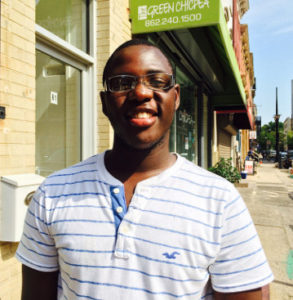 At Chapel Hill, Josh Yogo ’15 learned to help others by helping himself.
At Chapel Hill, Josh Yogo ’15 learned to help others by helping himself.
As a teenager, he learned quickly that the best way to help others address attention deficit hyperactivity disorder (ADHD) was to discuss his own experience with the condition and how he learned to manage this common neurobehavioral disorder.
Having recently completed NJPAC’s Summer Youth Performance Workshop — a five-week intensive arts training program in musical theater, vocal performance, acting or modern dance for students ages 13 to 18 — Josh not only sees a future in music theory, but also as a key component to creating bonds with children with disabilities.
And Yogo pointed to his student upbringing at Chapel Hill Academy as central to helping others as well as teaching him to help himself along the way.
Chapel Hill helped me really become the person I was inside. They helped me understand what I wanted to do. The value of that is immeasurable.
-Josh Yogo ’15
“One of my mentees was so gifted when it comes to music and getting things done. I’ve known him for seven years now to be part of his development has been wonderful beyond words,” Yogo said. “I wouldn’t have been able to be part of his life had it not been for the support I received here.”
A member of Chapel Hill’s Class of 2015, Josh will head to Essex County College this fall to study Early Childhood Education and Music Theory. He defines helping others both as a “calling and a blessing” and plans on taking his Associate degree from Essex County College to Montclair State University, where he will continue his studies.
“When it comes to kids with disabilities, I can relate to them and I can help as only I can, having faced the same challenges growing up,” he said.
“Every child I’ve mentored requires establishing a bond — you can’t force that relationship,” he said. “You have to find out their likes and dislikes and see you can relate.”
Music, he adds, provides a “very big connection.”
“The arts provide a real way to connect with people,” he said. “Whether it’s about being stressed, or academics, or even their home life, the arts allow you to create a bond—it’s a universal connection.”
Among Yogo’s recent accomplishments includes receiving the 2015 VSA Arts Achievement Award, the Governor’s Award in Arts Education for Vocal Performance, an ASAH – Connections for Success Scholarship, the AME Church Scholarship for Community Involvement, and the Chapel Hill Academy Annual Scholarship Award.
His experience at Chapel Hill Academy will help him throughout his collegiate and professional careers, Josh said, adding that he will continue to give back to his alma mater whenever possible.

